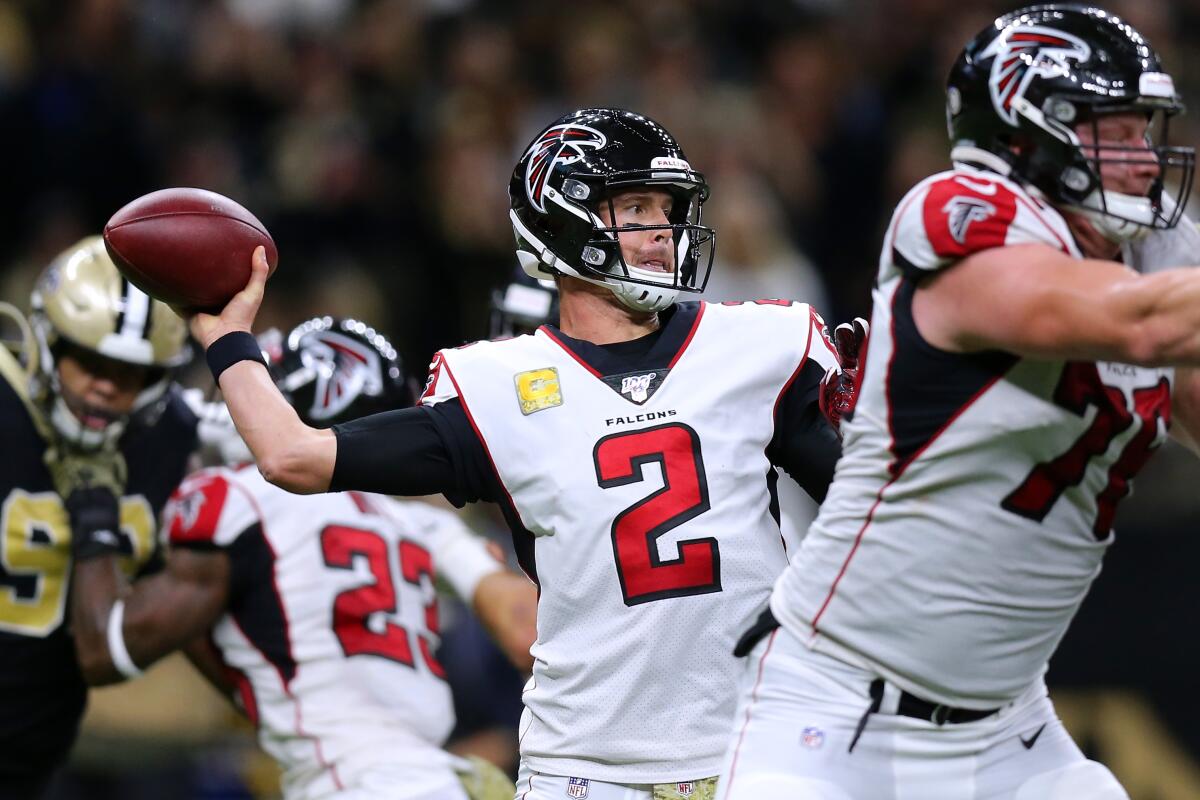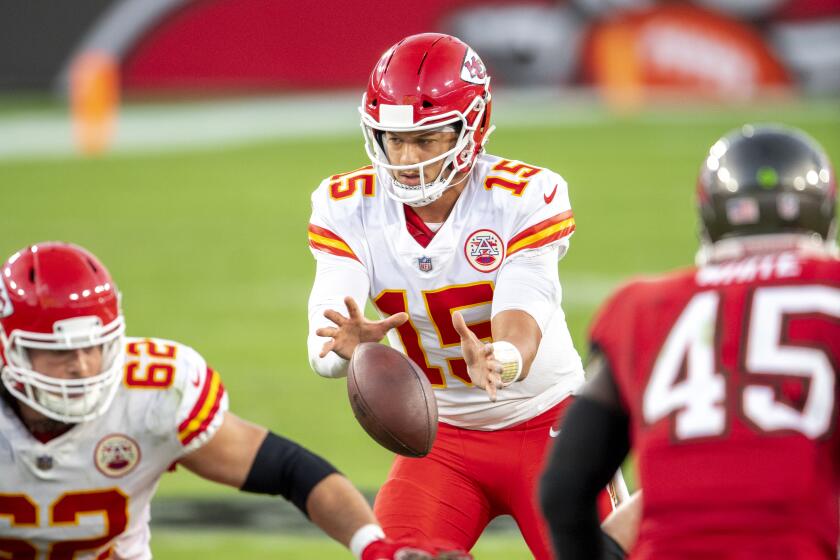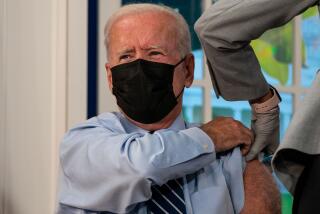The NFL discovers how to trounce vaccine hesitancy

- Share via
Two months ago, the National Football League resembled a hive of anti-vaccine sentiment.
Half of the league’s 32 teams had 50 or fewer players vaccinated against COVID-19 in mid-June, at a time when teams were permitted to carry rosters of up to 90 players.
As of Aug. 11, according to figures the league released through NFL.com, nearly 92% of all players have received at least one vaccine dose, and 15 teams have 95% or more of their players vaccinated.
We’re pleased with those numbers, but we’re not satisfied. We want to see them continue to go up.
— NFL chief medical officer Allen Sills
The Atlanta Falcons boasted Monday that they had become the first team to reach 100% vaccination, suggesting that vaccination has become a badge of honor in the NFL.
What happened? And what are the lessons for the rest of us?
Get the latest from Michael Hiltzik
Commentary on economics and more from a Pulitzer Prize winner.
You may occasionally receive promotional content from the Los Angeles Times.
The short answer to the first question is that the league put its foot down, hard, on any resistance to getting vaccinated against COVID-19. The league made its views known in a July 22 memo delineating the consequences to any of the 32 teams that experienced a viral outbreak traceable to unvaccinated staffers or players.
According to the memo, unvaccinated players and their teams would suffer the brunt of those consequences. Teams that have to cancel a game due to a spike among the unvaccinated will be considered to have forfeited the contest, earning them a loss and the opposing team a win. The loss would count against playoff seeding, among other competitive drawbacks.
The defaulting team will be “responsible for all additional expenses incurred by the opposing team.” The team will also be subject to additional sanctions from NFL Commissioner Roger Goodell if he determines that the outbreak resulted from a “failure by team personnel to follow applicable protocols.”
The league would make an effort to reschedule canceled games, but that could be difficult; the memo makes clear that it won’t consider extending the season to fit those games in. If the game can’t be rescheduled, neither team’s players will get paid for the canceled week.
As was the case in 2020, unvaccinated players or personnel who test positive will be quarantined for 10 days and then permitted to return to action once asymptomatic.
The NFL Players Assn. signaled its concurrence with the memo, telling its members that the 2021 rules were basically in accord with those jointly reached with the league for the 2020 season, with the exception of the league’s threat “to impose additional penalties on clubs which are responsible for the outbreak and the availability of proven vaccines.”
The memo had two evident thrusts. One is that it aimed to apply peer pressure, not to mention management pressure, on holdout players, since outbreaks among the unvaccinated would cost everyone dearly. It also signaled that the NFL was placing its not inconsiderable presence behind the very concept of vaccination in the battle against the pandemic.
How the NFL beat COVID-19 and made it to the Super Bowl.
“We know that vaccines are safe and effective and are the best step anyone can take to be safe from the coronavirus,” the memo states.
The 2021 rules built on the NFL’s experience in 2020, before the vaccine era. As I reported then, the league had instituted strict rules for testing and social distancing to guard against outbreaks. There were also heavy penalties, financial and competitive, on teams for breaching league protocols.
Even before the memo’s release, the NFL was seeing its vaccination rates on the upswing: Almost all the teams had reached 100% vaccination among their top-level staff, and more than 78% of all players had had at least one shot, with 14 teams having reached an 85% rate. All 32 teams had reached at least a 50% player vaccination rate.
“We’re pleased with those numbers, but we’re not satisfied,” the league’s chief medical officer, Dr. Allen Sills, said on the league’s “NFL Today” broadcast the day of the memo’s release. “We want to see them continue to go up.”
The league’s action places the spotlight on vaccine holdouts among the players and could create a quandary for coaches: A second-rank player or benchwarmer who refuses the shot can be cut for chump change, but starters may be a different story.
One is Minnesota Vikings quarterback Kirk Cousins, who has said that vaccination is a “private matter” but has indicated that he hasn’t had the shot. His stance has caused unending frustration for Vikings head coach Mike Zimmer and has cost Cousins a promotional deal with a local hospital.
Cousins says he’ll comply with NFL protocols on COVID-19, including undergoing frequent tests, and even offered to be isolated in a plexiglass cage for team meetings. But he says he intends to play every game this season.
Buffalo Bills wide receiver Cole Beasley has been especially insistent on refusing the vaccine. “I may die of covid, but I’d rather die actually living,” he tweeted in June.
The National Institutes of Health seems to have discovered what communities across the land already know: The National Football League is an untrustworthy partner.
How the NFL rules can be applied more widely is another question. The rules depend to a great extent on team spirit, but that won’t work in society at large.
Indeed, one hallmark of vaccine refusal is the lack of sensitivity by holdouts of the threat they pose to people with whom they come in contact and who might not be eligible for the shot, whether because they’re young children, have a compromised immune system or some other medical reason for going unvaccinated.
But the league’s policies may have a powerful effect on fans who have been resisting vaccination. To the extent NFL players are role models, their willingness to get vaccinated is a good sign. The NFL hasn’t consistently showered itself in glory when it comes to healthcare issues, but in this case it’s a model, and a good one.
More to Read
Get the latest from Michael Hiltzik
Commentary on economics and more from a Pulitzer Prize winner.
You may occasionally receive promotional content from the Los Angeles Times.











